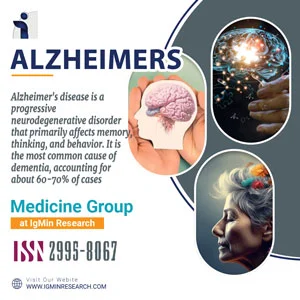关于
Alzheimer's disease is a progressive neurodegenerative disorder that leads to cognitive decline, memory loss, and behavioral changes. It is one of the most common causes of dementia, significantly impacting individuals, families, and healthcare systems worldwide. The study of Alzheimer's focuses on understanding the underlying mechanisms of neurodegeneration, exploring factors like amyloid-beta plaques, tau tangles, and neuroinflammation. Researchers in this field are committed to discovering innovative diagnostic tools, preventive strategies, and effective therapies to slow the progression of this debilitating disease.
Advances in Alzheimer's research are crucial for addressing the growing global burden of this condition, especially in aging populations. By integrating insights from genetics, molecular biology, and neuroscience, researchers are unraveling the complex interactions that contribute to the onset and progression of Alzheimer’s. This multidisciplinary approach holds promise for developing novel interventions, improving patient care, and ultimately enhancing the quality of life for those affected by the disease.

Why publish with us?
Global Visibility – Indexed in major databases
Fast Peer Review – Decision within 14–21 days
Open Access – Maximize readership and citation
Multidisciplinary Scope – Biology, Medicine and Engineering
Editorial Board Excellence – Global experts involved
University Library Indexing – Via OCLC
Permanent Archiving – CrossRef DOI
APC – Affordable APCs with discounts
Citation – High Citation Potential
现在哪些文章在热门?
研究文章
- Unveiling the Hidden Beat: Heart Rate Variability and the Vagus Nerve as an Emerging Biomarker in Breast Cancer Management
- Melanocytic Nevi Classification using Transfer Learning
- Lunar-Derived Propellants for Fueling Mars-Bound Spacecraft in Cis-Lunar Space
- Influence of Polycarboxylate Superplasticizer on the Calorimetric and Physicomechanical Properties of Mortar
- Maternal Knowledge and Practices in Caring for Children under Five with Pneumonia: A Cross-Sectional Study in Vietnam
- Enhancing Missing Values Imputation through Transformer-Based Predictive Modeling
Advertisement






